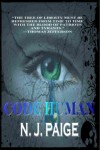

August 3 – 9: “What do you look for when selecting a critique group?”
 This week we’re talking writer’s critique groups and we’re joined by ITW Members N. J. Paige, Donald J. Bingle, Joel Gomez-Dossi, Laura Elvebak and James Abel, who will answer the question: “What do you look for when selecting a critique group to help polish your writing?”
This week we’re talking writer’s critique groups and we’re joined by ITW Members N. J. Paige, Donald J. Bingle, Joel Gomez-Dossi, Laura Elvebak and James Abel, who will answer the question: “What do you look for when selecting a critique group to help polish your writing?”
~~~~~
 N. J. Paige lives in Pennsylvania with her husband and two children. Her favorite motto is “Life is a journey best taken one step at a time.” And one of her favorite pass-time activity is to hike through her local forest, where she gets inspiration from Tree-sprites.
N. J. Paige lives in Pennsylvania with her husband and two children. Her favorite motto is “Life is a journey best taken one step at a time.” And one of her favorite pass-time activity is to hike through her local forest, where she gets inspiration from Tree-sprites.
 James Abel is a pseudonym for a best selling author and Arctic expert, who has covered the region for Smithsonian, Parade, Outside, and Readers Digest Magazines, and this coming summer, for Newsweek. He has appeared on Morning Joe, Dan Rather Reports and Nightline to discuss Arctic issues.
James Abel is a pseudonym for a best selling author and Arctic expert, who has covered the region for Smithsonian, Parade, Outside, and Readers Digest Magazines, and this coming summer, for Newsweek. He has appeared on Morning Joe, Dan Rather Reports and Nightline to discuss Arctic issues.
 Donald J. Bingle, a retired corporate attorney, is the author of four thrillers and about fifty short stories. He was the world’s top-ranked player of classic role-playing game tournaments for fifteen years. Don is a member of the International Thriller Writers, Science Fiction and Fantasy Writers of America, Horror Writers Association, International Association of Media Tie-In Writers, Humor Writers of America, Gen Con Writers Symposium, Origins Game Fair Library, and St. Charles Writers Group.
Donald J. Bingle, a retired corporate attorney, is the author of four thrillers and about fifty short stories. He was the world’s top-ranked player of classic role-playing game tournaments for fifteen years. Don is a member of the International Thriller Writers, Science Fiction and Fantasy Writers of America, Horror Writers Association, International Association of Media Tie-In Writers, Humor Writers of America, Gen Con Writers Symposium, Origins Game Fair Library, and St. Charles Writers Group.
 Writer Joel Gomez-Dossi came to journalism by way of theater, television, and digital media production. He was a stage manager for several theaters in the Mid and Southwest; a producer for television projects; and a production manager for the Emmy Award-winning PBS science series, Newton’s Apple. Joel has written about film and theater for many regional publications across the country, and penned an entertainment column for the queer press that ran in twelve states. Pursued is his first novel. Joel and his husband live happily ever after in upstate New York.
Writer Joel Gomez-Dossi came to journalism by way of theater, television, and digital media production. He was a stage manager for several theaters in the Mid and Southwest; a producer for television projects; and a production manager for the Emmy Award-winning PBS science series, Newton’s Apple. Joel has written about film and theater for many regional publications across the country, and penned an entertainment column for the queer press that ran in twelve states. Pursued is his first novel. Joel and his husband live happily ever after in upstate New York.
 Laura Elvebak studied writing at UCLA, USC, Rice, and Beyond Baroque. She has penned several magazine articles, co-wrote, directed and acted in a one-act play, optioned three screenplays, and co-wrote a script for the 48 Hour Film Project. She is the author of the Niki Alexander mysteries, Less Dead and Lost Witness. A standalone, The Flawed Dance, is due from Black Opal Books on July 18, followed by the third Niki Alexander mystery, A Matter of Revenge. She is the treasurer and newsletter editor of the Southwest Chapter of MWA, a member of Sisters-In-Crime, The International Thriller Writers, and The Final Twist Writers.
Laura Elvebak studied writing at UCLA, USC, Rice, and Beyond Baroque. She has penned several magazine articles, co-wrote, directed and acted in a one-act play, optioned three screenplays, and co-wrote a script for the 48 Hour Film Project. She is the author of the Niki Alexander mysteries, Less Dead and Lost Witness. A standalone, The Flawed Dance, is due from Black Opal Books on July 18, followed by the third Niki Alexander mystery, A Matter of Revenge. She is the treasurer and newsletter editor of the Southwest Chapter of MWA, a member of Sisters-In-Crime, The International Thriller Writers, and The Final Twist Writers.
- LAST GIRL MISSING with K.L. Murphy - July 25, 2024
- CHILD OF DUST with Yigal Zur - July 25, 2024
- THE RAVENWOOD CONSPIRACY with Michael Siverling - July 19, 2024
